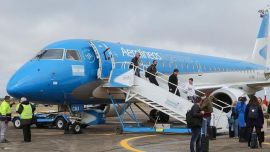Argentina has "made progress" in talks with the International Monetary Fund (IMF) aimed at securing an accelerated disbursement of parts of a US$50-billion loan it hopes will calm the ongoing economic turbulence facing the nation.
IMF Managing Director Christine Lagarde said she and Finance Minister Nicolás Dujovne held "discussions about how the Fund can best support Argentina in the face of renewed financial volatility and a challenging economic environment."
Lagarde said talks would continue today, aiming to reach "a rapid conclusion to present a proposal to the IMF Executive Board."
Dujovne said it was too early to "give figures when we're in the middle of discussions with authorities."
On Tuesday, US President Donald Trump expressed "strong support" for Argentina and President Mauricio Macri, who has announced plans to slash the country's bureaucracy and raise taxes on exports to calm battered financial and currency markets and get the economy back on an even keel.
"I have confidence in President Macri's leadership, and I strongly encourage and support his engagement with the International Monetary Fund to strengthen Argentina's monetary and fiscal policies to tackle the country's current economic challenges," Trump said in a statement after speaking with Macri.
The peso has lost half its value against the dollar this year, hampering government efforts to get inflation under control. Argentina has already used a first US$15-billion tranche of the three-year line of credit agreed in June, mainly to prop up its currency.
Possibility of default
Analysts warned that failure to reset the terms of the IMF loan would be costly.
"Failure to secure further IMF funding or fiscal slippage before large debt repayments due in November would make default a very real possibility," said Capital Economics in a note.
Andrés Abadia of Buenos Aires consultancy Pantheon said Argentina's austerity measures "should be seen as a positive, but market confidence in Argentina remains fragile."
"The meeting with the IMF will probably help to have a clearer picture of the country's prospects," Abadia added.
Slashing of ministries
The Washington talks come a day after Macri announced he is slashing the number of government ministries by half and restoring a tax on booming grain exports to bring deficits under control.
The move signalled the abandonment of a gradualist approach to reducing inflation by the market-friendly president, who was elected in 2015. "We must move a lot faster," Marci said in a televised address.
Macri, in turn, appealed to rich exporters to do their bit.
"We know that this is a bad tax, but I have to ask them to understand that it is an emergency and we need their contribution," he said.
At the current exchange rate, the move would put an extra US$7.1 billion in state coffers.
Low investor confidence
Ratings agency S&P said Macri's government must now show clear steps to improve low investor confidence.
"Exchange rate volatility, as shown by recent pressure on the Argentine currency, could jeopardize the effective implementation of economic adjustment measures, absent further steps to boost investor confidence," it said in a statement on Friday.
S&P sees hope in Macri's austerity measures however, which has seen his government slash energy subsidies and shed 95,000 public service jobs since January.
It suggested that IMF help, coupled with continued austerity measures, could help gradually reduce inflation, which despite being a government priority, is still running at more than 20 percent.
Bitter history
Macri will be hoping to ride out a domestic storm from a public sector incensed at his austerity drive to maintain Argentina's access to capital markets, which it was excluded from for over a decade.
However, Argentines point to increasing food, transport and energy prices, saying they are paying an unacceptable price under Macri's austerity programme.
A recent poll by the Center for the Study of Work and Development showed that one in two employed people fear losing their job.
Argentina has a bitter history with the IMF, which it last called on in 2001. Many Argentines view the tough conditions imposed by the crisis lender then as having made the crisis all the harder to bear.
- TIMES/AFP


























Comments